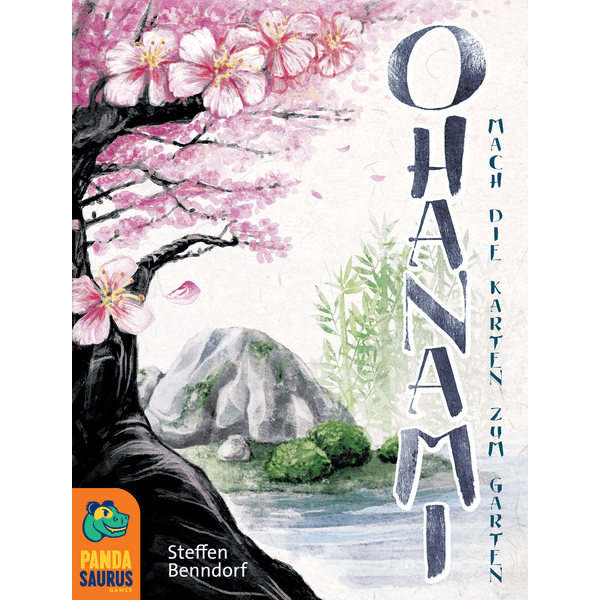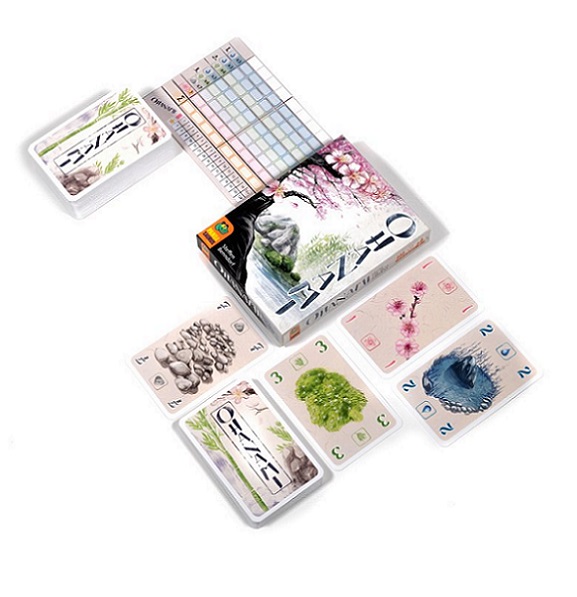Build Gardens of Greens, Water, and Cherry Blossoms in Card Game Ohanami

Build three gardens, but choose carefully which cards you add to them, as you can only add cards to each that are higher or lower than any card already played there.
From the designer of The Game and publisher Pandasaurus Games comes Ohanami, a light, easy-to-learn card game with plenty of intriguing choices and a clever scoring system.
Gameplay
The deck of 120 cards is shuffled and placed in the center of the table. Each card is one of four colors and has a number 1 through 120.
At the start of each round, each player is dealt ten cards. Players simultaneously select two cards and then pass the remaining cards to the player on their left in rounds one and three, and to the player on their right in round two. Each player then chooses what to do with their two cards. For each card, you may choose to add it to a column already in front of you or start a new column (you may only have a total of three columns during the game). Each column represents one of your gardens.
When adding a card to a column its number must either be lower than the lowest numbered card already in the garden or higher than the highest numbered card already in the garden. You do not have to add both cards to the same garden. If you cannot legally add one or both cards to your gardens, or choose not to, you may also discard one or both cards face-down to the discard pile.
Play continues in this way until all ten cards in each hand have been selected and played. The round ends and cards are scored, before dealing each player another ten cards and starting a new round. Cards stay in your garden from one round to another, and the game lasts three rounds.
During round one, only the blue cards in your garden score points. Blue cards are worth three points each. At the end of round two, only the blue and green cards score. Green cards are worth four points each. At the end of round three, all cards are scored. Grey cards are worth seven points each, and you earn a set amount of points for your pink cards based on how many you have across all your gardens. The player with the most points wins the game.

Review
Ohanami takes about two minutes to explain and is easy to set up and go, but the choices presented are intriguing. It shares some of the same puzzle elements as The Game while still feeling entirely like its own unique experience.
The scoring system is fantastic and adds extra elements to your choices each turn. Blue cards are worth the most points if you get them into your gardens on round one, but steadily become less valuable when added later. You also can’t simply add in all the blues that come your way during round one, as you have to keep an eye out for their numbers and what options will be left open to you during the later rounds. This all gives you several elements to balance each turn.
There's not too much direct player interaction in this game, however. You can keep an eye on what your opponents are doing in their gardens and draft cards to keep them out of their hands, but you have to be careful with this as you need to keep in mind your own garden and what numbers you have where. However, the ability to discard rather than use cards, does mean this is an option you can take when there’s nothing helpful to you in the cards you have to choose from.
The game is very compact and portable. It comes in a small, light box that makes it easy to pack and takes up minimal space. The cards are a nice quality and the artwork is pretty. For a game about gardens, we would have enjoyed art that was a little more enchanting, but this is likely to be subjective and the art is nice enough to look at.
Ohanami is thoroughly enjoyable, addictive to play, relaxing, and just a lovely experience. It’s a game you’re likely to want to play several times in a row, and the speed of turns and rounds ensures this is easy to do.
Pros: Great scoring system, intriguing choices on each turn
Cons: Minimal player interaction
Disclosure: we received a complimentary review copy of this game.







